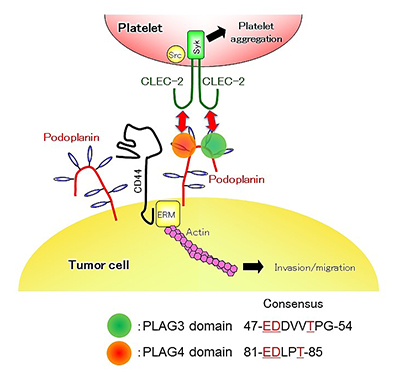- HOME
- Outstanding Progress
Targeting a novel domain in podoplanin for inhibiting platelet-mediated tumor metastasis
Takaya Sekiguchi1,2, Ai Takemoto1, Satoshi Takagi1, Kazuki Takatori1,2, Shigeo Sato1, Miho Takami1, Naoya Fujita1,3*
Oncotarget In press
Affiliation
- Division of Experimental Chemotherapy, Cancer Chemotherapy Center of JFCR
- Graduate School of Frontier Sciences, the University of Tokyo
- Director’s Room, Cancer Chemotherapy Center of JFCR
*Corresponding author
 Podoplanin, also known as Aggrus, is a sialoglycoprotein expressed on various cancers. We previously identified podoplanin as a key factor for tumor-induced platelet aggregation. The podoplanin-mediated platelet aggregation enhanced tumor growth and metastasis by secreting growth factors and by forming tumor emboli in microvasculature, respectively. Thus, precise analysis of the mechanisms of podoplanin-mediated platelet aggregation was desired for developing new anti-tumor therapies. Here we report the discovery of a novel platelet aggregation-inducing PLAG4 domain (81-EDLPT-85) in human podoplanin. PLAG4 domain has some homology to the previously reported PLAG3 domain and contributes to the binding to its platelet receptor CLEC-2. Analysis using point mutants and deletion mutants revealed that PLAG4 domain exhibited predominant platelet-aggregating function over PLAG3 domain, and that conserved Glu81/Asp82/Thr85 residues in PLAG4 domain were indispensable for the binding to CLEC-2. By immunizing mice with PLAG4 containing peptide, we established anti-PLAG4 neutralizing mAbs. We found that the mAbs could suppress CLEC-2 binding, platelet aggregation and tumor emboli formation in vivo, suggesting the importance of PLAG4 domain in platelet-aggregating function. Our results indicate the requirement of simultaneous inhibition of PLAG3/4 domains for complete suppression of podoplanin-mediated tumor growth and metastasis.
Podoplanin, also known as Aggrus, is a sialoglycoprotein expressed on various cancers. We previously identified podoplanin as a key factor for tumor-induced platelet aggregation. The podoplanin-mediated platelet aggregation enhanced tumor growth and metastasis by secreting growth factors and by forming tumor emboli in microvasculature, respectively. Thus, precise analysis of the mechanisms of podoplanin-mediated platelet aggregation was desired for developing new anti-tumor therapies. Here we report the discovery of a novel platelet aggregation-inducing PLAG4 domain (81-EDLPT-85) in human podoplanin. PLAG4 domain has some homology to the previously reported PLAG3 domain and contributes to the binding to its platelet receptor CLEC-2. Analysis using point mutants and deletion mutants revealed that PLAG4 domain exhibited predominant platelet-aggregating function over PLAG3 domain, and that conserved Glu81/Asp82/Thr85 residues in PLAG4 domain were indispensable for the binding to CLEC-2. By immunizing mice with PLAG4 containing peptide, we established anti-PLAG4 neutralizing mAbs. We found that the mAbs could suppress CLEC-2 binding, platelet aggregation and tumor emboli formation in vivo, suggesting the importance of PLAG4 domain in platelet-aggregating function. Our results indicate the requirement of simultaneous inhibition of PLAG3/4 domains for complete suppression of podoplanin-mediated tumor growth and metastasis.





